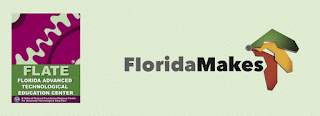Last year, FLATE hosted its 11th annual National Visiting Committee (NVC)
in Miramar, FL. Usually these meetings
are held at an industry location somewhere in the state. This year, however, we met at FLATE’s host institution and campus, Hillsborough Community College
Brandon campus. The FLATE NVC provides advice, advocacy, assessment and
assistance not just at this one strategic meeting each year, but also more
informally, during the months in between. We are proud of not only the size of
our committee, but also its composition of 12 dedicated
individuals with interest in the state of manufacturing technician education in
Florida and across the country. A typical one-and-half to two-day meeting agenda includes
a number of standard “sessions” including:
- Reporting and updating on activities and programs during the past year
- Evaluation report from an external evaluator
- Overview of a local technician program and its students
- Visit to a local industry
- Discussions with the Center’s NSF ATE program officer (typically this is done remotely)
- Closed session for the NVC to discuss concerns, recommendations and plaudits
- NVC report out to the Center Leadership and NSF program officer
This year we showcased the HCC Engineering Technology program and some of the students currently enrolled in the two year A.S. in engineering technology degree. We also visited Timbar, a local box-making facility which houses a fascinating high-tech, high-speed production facility near our campus. FLATE also invited our Tampa Bay area stakeholders to meet and interact with our NVC members on Thursday evening to share their stories of working with FLATE. Leo Reddy, Chair and CEO of MSSC addressed this mixed group and gave his view of manufacturing industry credentials and its importance in addressing current skills gap.
Every year this annual NVC meeting provides a great opportunity for us at
FLATE to look back retrospectively and assess what we have accomplished in the
previous year. We look for previously unidentified synergies, make improvements
in processes, projects, etc., and plan for the upcoming year by identifying opportunities
to scale and leverage projects, activities and partners. Of course this summing
of our year’s work also lets us follow our Sterling Quality plan by providing
us time to focus on things we can improve and tweak in various aspects of our
work including evaluation, processes, communications, and operations. Our
evaluator, Phil Centonze would say this is part of the ongoing improvement process
that helps us evaluate the ideas we are considering implementing for additional
impact.
The
meeting is now over, but the NVC is still preparing their annual report that is
directly submitted to our NSF program officer. The NVC report is one of several
reporting requirements for NSF ATE Centers that together weave a picture of our
progress, successes, intellectual merit and broader impacts. Next month, we
will share the NVC’s recommendations and concerns, so stay tuned for additional
updates.
Our work
for 2016 and beyond has just begun. We start this endeavor by highlighting some
of our current and ongoing projects, partnerships and events. In this edition
get up-to-speed with updates from the recent Florida Career Pathways Symposium
where educational leaders and practitioners discussed initiatives impacting
career & technical education in Florida. We also have two stories about our
new partnerships: one with FloridaMakes; the other Duoc UC in Santiago, Chile,
both of which solidifies FLATE’s strategic mission to support growth of Florida
manufacturing and technician education and training through exchange programs
with some of our international partners.
As we
draw closer to Spring we encourage you to support local robotics events. Read
the article about the 2016 National Robotics week to see how you can locally
participate in this national event, or tune into the piece about the
Engineering Academy at Greco Middle School and learn how local schools are
educating the next generation of engineers. We have a new sTEm puzzle to
challenge your STEM skills this month, and a short round up on Suncoast
Technical College students as they surge ahead in getting NIMS certified.
This and
much more in this edition of the FLATE Focus. We love hearing from you so send
us your thoughts by scribbling a few lines below each blog post. You can also
connect with us socially on LinkedIn, Facebook, or tweet us @Made_InFlorida.




















